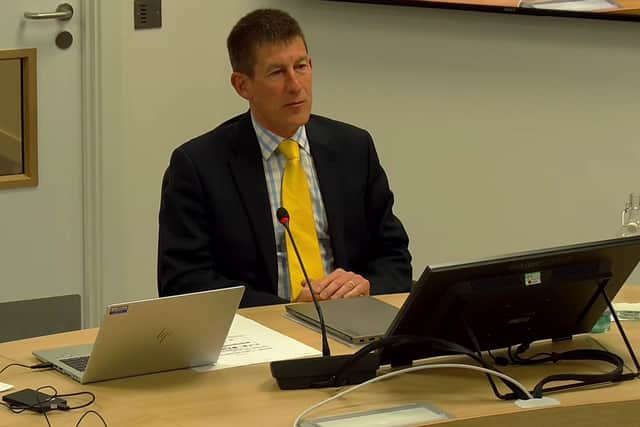Ventilation expert tells Scottish hospitals inquiry of 'thermal wheels' risks
and live on Freeview channel 276
Dr Shaun Fitzgerald, a chartered engineer with two decades’ experience in the field of building ventilation, was questioned about the general use of thermal wheels – mechanisms deployed in ventilation systems to pass some of the heat of the air extracted from rooms to a supply of fresh air.
An independent review in June 2020 into the design of the Queen Elizabeth University Hospital (QEUH) in Glasgow heard witness statements which identified problems involving the use of such a wheel in its children’s haemato-oncology ward.
Advertisement
Hide AdAdvertisement
Hide AdIt stated while the devices increase energy efficiency, they risk cross contamination from extract air to intake air ducts, as well as air leaking from voids. The report found the use of thermal wheels is permissible under NHS guidance for general wards, but not where vulnerable patients are treated.
“The supervisor raised the issue of problems with future change of use where thermal wheels were specified,” the review added. “Therefore it would seem that, between design and installation, the use of these rooms should have triggered removal of the thermal wheel, but this was not the outcome.”
At the resumption of the public inquiry, specific issues relating to ventilation at the QEUH and the Royal Hospital for Children and Young People (RHCYP) and Department of Clinical Neurosciences in Edinburgh were not addressed.
However, when asked in general terms by John McGregor QC, deputy counsel to the inquiry, whether the installation of the devices could impact on their cleanliness, Dr Fitzgerald said “no system was absolutely bulletproof”.


Advertisement
Hide AdAdvertisement
Hide AdThe fellow of the Royal Academy of Engineering explained there was a “greater risk” if the system was not configured correctly. “In my discussion with manufacturers, that’s something that concerns them,” he said.
“If they’ve been installed incorrectly, then the pressure difference between the outflowing air and the incoming air can increase the risks, so it’s really important they’re configured correctly.”
He explained that in a healthcare setting, that would mean any contaminated air being exhausted could enter other “unintended” spaces.
“Could that potentially be significant if one was dealing with vulnerable patients, such as immunosuppressed patients?” Mr McGregor asked.


Advertisement
Hide AdAdvertisement
Hide Ad“Theoretically I believe it could be, but it would depend therefore in large part on what other measures you might have in your system,” said Dr Fitzgerald.
The inquiry into safety and wellbeing issues at two Scottish hospitals later heard from Edward McLaughlan, a former assistant director of Health Facilities Scotland, a body that provides support to NHS Scotland regarding the design, operation, maintenance and disposal of its buildings
The 59-year-old was accountable for various services, including infection prevention in the built environment, and critical engineering services such as water systems and ventilation.
Under questioning from Mr McGregor, he described Scottish Health Technical Memorandums (SHTM) as essentially “engineering guidance notes” produced to “assist the service and help to promote common good quality standards”.
Advertisement
Hide AdAdvertisement
Hide AdHe said SHTMs were issued to health boards as guidance, but if they were specified in a contract, they became contractual requirements.
The inquiry, which is being chaired by Lord Brodie QC, continues.
Comment Guidelines
National World encourages reader discussion on our stories. User feedback, insights and back-and-forth exchanges add a rich layer of context to reporting. Please review our Community Guidelines before commenting.
